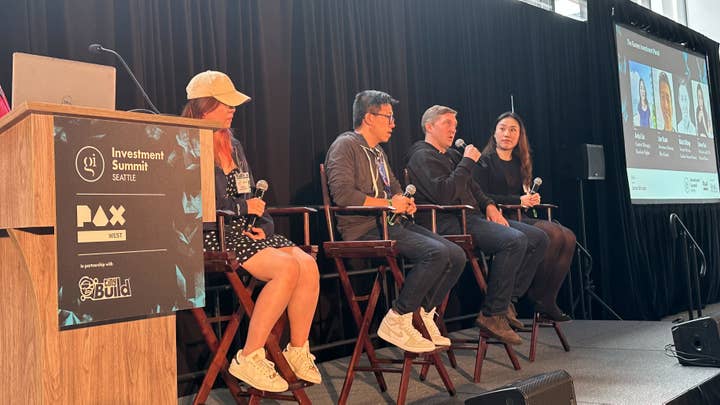The current state of games investment
Investors and publishers discuss the biggest challenges of the past few years, and how this might change when global economic uncertainty eases
Sign up for the GI Daily here to get the biggest news straight to your inbox
While the games industry benefited from a surge of interest and investment during the pandemic, the market correction and global economic uncertainty means the environment for seeking finance has changed dramatically in just a couple of years.
At last month's GamesIndustry.biz Investment Summit in Seattle, a panel of experts discussed the investment landscape at the moment – a conversation we will continue at the next summit in London on Thursday, October 12.
Kowloon Nights content manager Anlu Liu observed that investors are currently being a lot more cautious due to the "tough economic environment," adding: "For equity investments, investors want to see strong organic growth and positive cash flows as opposed to growth via acquisitions, as it may not be sustainable. On the publishing and project financing side, investors are more cautious about team background, also less prototype funding and signing fewer first-time teams."

Hiro Capital's investment director Joe Yuan added that everyone has been slower in the ecosystem.
"Investors are taking longer to issue term sheets and complete transactions, strategics have been slower on M&A and reducing valuations as many of the big buyers are digesting acquisitions of the past, and publishers are being careful about filling up their pipeline with the right deals," he explained. "This means companies need to make their runway stretch further and show more detail on their progress as they look to close additional funding."
Matt Bilbey, a venture partner at London Venture Partners, observed that seed stage funding is still very much active – in fact, he said that valuations are now back in line with 2018/2019 levels. However, the scope for later stage funding continues to be the biggest challenge when it comes to both venture capital firms and publishers.
"Later stage investors want more proof points and evidence of traction, whether that is in the community or early testing," he said. "Or they are piling into more predictable business models like B2B. In the current landscape investors feel the need to look at a lot of details, then it often leads to analysis paralysis, and we see this a lot at the moment. Investors are keen to engage, have a lot of data requests, then dig in deeper and deeper, and in the end they just don’t get there."
He noted that last year saw drastic changes in the type of companies and projects that received investment. Towards the start of 2022, money was still pouring into crypto, eSports, VR, PC-first content, multiple strategies on mobile, cross-platform games and so on. By mid-2022, most of these were "judged not worthy of investment", with the exceptions of PC-first and cross platform.
"Investors sometimes pushed a lot of self-sufficient studios into expanding too much, to the point where budget outpaced market potential"
Snow Rui, Hooded Horse
"Lots of funds are sitting on large amounts of dry powder and are waiting for the right company to come through their funnel, they are merely delaying on deployment," Bilbey explained. "This is a similar story for publishers, waiting for projects that can contribute significant topline growth."
Snow Rui, president and CFO of Hooded Horse, noted that larger companies making safer bets are starting to venture into the indie publisher's space.

"The biggest challenge for us is that some of our competitors who were aiming for projects in a higher budget range 18 months ago are now changing their focus to the budget range we have been looking at. This has increased competition in scouting, although only by a moderate amount thanks to our reputation as a genre-focused publisher of strategic and tactical games."
Inevitably, the conversation turned towards artificial intelligence – the buzzword du jour – and whether this is attracting the most attention from investors. Bilbey noted that a lot of money is being funnelled into this space, pointing to Mistral AI's seed round of $113 million and Poolside AI's of $126 million as examples.
"The majority of investors will be looking for generative AI investments," he said. "However, that is not to say there aren’t any investing elsewhere."
He went on to explain that growth in the industry is usually driven by shifts in technology and/or distribution that improve one or more of three factors: audience expansion, audience engagement, and monetisation. Bilbey further posited that AI could be the first shift since smart devices that potentially addresses all three.
"Of course, with any hyped technology there is a lot of smoke in the air and it’s important to be wary of this," he said. "We have been seeing lot of pitches where AI is just thrown in as some sort of checkbox."
Yuan added: "Quite a bit of Hiro Capital's portfolio is looking into the benefits of generative AI, but we're not expecting it to have a transformational impact on [the games] development process right away. We've seen a number of pitches with generative AI as a part of the story, but we're cautious on whether these deals are actually leveraging the technology in a realistic way for the near-term, versus making promises that may be impossible to deliver within their runway window."

The panel emphasised that there are plenty of other trends on the horizon that may turn investors' heads. Liu, for example, pointed to photogrammetry: the process of creating 3D assets from 2D images using AI software.
"It is not something new, but it used to be only used by bigger companies as it was not cheap," she said.
Rui, meanwhile, is more excited about user-generated content: "UGC is not strictly speaking a 'Next' Big Thing in that it's been a trend in the making for more than 30 years. From decades of real-world examples, we can see that free mod support is something that has amazing potential to increase both the profitability and longevity of games – frankly, making the games better and more fun.
"UGC is also a great way to engage players and build a lasting community around a game. Although conversely, I am against paid mods as they severely damage all these benefits of free and open UGC."
Bilbey agreed, pointing to the success of Roblox, but also the rise of alternatives such as Look North World and more recently Unreal Editor for Fortnite. He also listed two other areas he expects to take off: Massively Interactive Live Events (MILEs), where audiences interact with a live broadcast to change the outcome of the content that's being streamed, and gamified apps such as Duolingo and Snap.
In terms of how the investment landscape might change in the near future, Yuan observed that things are picking up slightly "as the macro hasn't been as bad as people have feared." Even so, Hiro Capital doesn't expect the environment to dramatically improve until Q2 2024 at the earliest.
"It might coincide with interest rates declining and the easing of restrictive policies, but it's unclear when that may be given inflation will be hard to predict," he said. "We've certainly been more selective and careful about capital deployment this year vs last year. Overall, I think there's fewer new deals being completed as investors have to support existing investments that may need to bridge to another key milestone or KPI data."
"Investors are placing more emphasis on raising enough cash to get them through the next 24 months in the hope that the markets ease"
Matt Bilbey, London Venture Partners
Liu added: "As interest rates are kept high and unlikely to go down this year, I think that investors will continue to remain cautious and only seek out quality companies – typically those with a proven track record of profitability and sustainable growth.
"From our perspective, and by speaking with many other publishers like us, I feel that the whole industry is leaning towards signing more mature products and taking less risky bets. There is less prototype funding options out there, and companies are way more mindful of budgets when evaluating titles."
Rui is also not expecting too much change, although she did say she believes the industry has now course-corrected after the pandemic.

"It is a true correction in my opinion, because the more cautious and practical approach today will be healthier for the industry and more sustainable for the long run.
"One of the saddest things that happened during the period of loose money was that investors encouraged – sometimes even pushed – a lot of previously self-sufficient studios into expanding their team and budget too much, to the point where budget outpaced market potential and the studios were no longer sustainable without investor support. When money became tight again, investors pulled their support, and the studios had to downsize or even shut down. This damage could have been avoided with the more cautious approach people are starting to adopt now."
Bilbey concluded by warning that the industry could still be in for some tough times: "We expect that the bulk of bankruptcies in gaming is still ahead of us, as more and more companies run out of funds and fail to get to profitability, and then fail to raise due to not having enough traction or being a segments that no longer see investment or having raised too much already, versus the traction they have generated or for a range of other reasons. We expect the peak bankruptcies to be in the next 12 to 18 months.
"Investors are aware of how inflation is making the runway shorter due to salaries and the cost of services and goods increasing. Therefore, I think investors are placing more emphasis on raising enough cash to get them through the next 24 months in the hope that the markets ease."
The GamesIndustry.biz Investment Summit will return next month, taking place at London's Excel Centre alongside EGX 2023 on Thursday, October 12. Find out more about the event here, and be sure to buy your tickets.
Sign up for the GI Daily here to get the biggest news straight to your inbox

